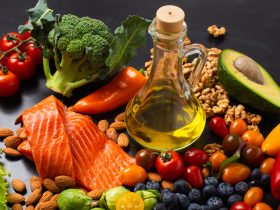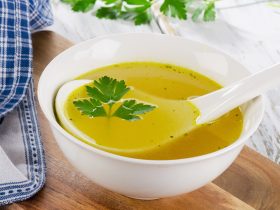Both vegetarian and ketogenic diets have garnered attention for their potential health benefits. The ketogenic diet, often referred to as keto, is a high-fat, low-carb dietary approach that has recently gained significant popularity. While it typically incorporates animal products like meat, fish, and poultry, it can be adapted to suit a vegetarian lifestyle. This article serves as your comprehensive guide to the vegetarian keto diet.
What Is Vegetarian Keto Diet
The vegetarian keto diet melds the principles of vegetarianism with those of keto dieting. Vegetarians generally include animal products such as eggs and dairy while abstaining from meat and fish consumption.
On the other hand, the ketogenic diet is characterized by a high-fat intake coupled with strict carb limitation, often ranging from 20 to 50 grams per day. This extremely low-carb regimen induces a state known as ketosis, wherein your body shifts from using glucose to burning fat for energy.
In a conventional ketogenic diet, approximately 70% of your daily caloric intake should be derived from fats, including oils, meat, fish, and full-fat dairy.
However, the vegetarian keto diet omits meat and fish from the equation, relying instead on alternative sources of healthy fats, such as coconut oil, eggs, avocados, nuts, and seeds.
Health Advantages
Although no specific studies have explored the distinct benefits of the vegetarian keto diet, ample research has delved into the two-parent diets.
Facilitates Weight Loss
Both vegetarian and ketogenic diets have been linked to weight loss.
A comprehensive review of 12 studies revealed that individuals adhering to a vegetarian diet shed an average of 4.5 pounds (2 kg) more than non-vegetarians over 18 weeks.
Moreover, in a 6-month study involving 74 individuals with type 2 diabetes, vegetarian diets proved more effective at promoting fat and weight loss than traditional low-calorie diets.
Similarly, in an investigation spanning 6 months and encompassing 83 participants with obesity, the keto diet yielded substantial reductions in weight and body mass index (BMI), resulting in an average weight loss of 31 pounds (14 kg).
The substantial presence of healthy fats in this diet may also contribute to prolonged satiety, diminishing feelings of hunger and appetite.
Safeguarding Against Chronic Diseases
Vegetarian diets have demonstrated associations with a decreased risk of numerous chronic ailments.
Indeed, research has linked them to a reduced risk of cancer and improved markers for heart disease, including BMI, cholesterol levels, and blood pressure (9Trusted Source, 10Trusted Source).
The keto diet, too, has undergone scrutiny regarding its impact on disease prevention.
In a 56-week study involving 66 participants, the keto diet significantly reduced body weight, total cholesterol, LDL (bad) cholesterol, triglycerides, and blood sugar levels — all recognized risk factors for heart disease.
Additional investigations suggest that this dietary approach may promote brain health and could be beneficial in managing conditions such as Parkinson’s and Alzheimer’s diseases.
Furthermore, animal and laboratory studies indicate that the keto diet may inhibit the growth of cancerous tumors, although further research is required to confirm these findings.
Enhancing Blood Sugar Control
A comprehensive review of six studies established a significant reduction in HbA1c levels, a long-term blood sugar control marker, among individuals following vegetarian diets.
Additionally, a 5-year study involving 2,918 participants revealed a remarkable 53% reduction in diabetes risk associated with adopting a vegetarian diet.
Meanwhile, the keto diet is known to enhance the body’s regulation of blood sugar and increase insulin sensitivity, a hormone crucial in blood sugar management.
In a 4-month study featuring 21 participants, adherence to a keto diet led to a remarkable 16% reduction in HbA1c levels. Remarkably by the study’s conclusion, 81% of participants could reduce or even discontinue their diabetes medications.
Considerations for the Vegetarian Keto Diet
While the vegetarian keto diet offers potential benefits, it also has certain drawbacks.
Proper planning is essential when following vegetarian diets to ensure adequate nutritional intake.
Research indicates that these dietary patterns often fall short in essential nutrients like vitamin B12, iron, calcium, and protein.
The vegetarian keto diet adds an extra layer of restriction by limiting nutrient-rich food groups, including fruits, legumes, and whole grains, thereby heightening the risk of nutritional deficiencies.
To address this concern, it’s crucial to monitor nutrient intake meticulously and diversify your diet with wholesome, nutrient-rich foods to meet your body’s vitamin and mineral requirements.
Supplementation may also prove beneficial, particularly for nutrients frequently lacking in vegetarian diets, such as vitamin B12.
Potential for Keto Flu-Like Symptoms
Transitioning into a state of ketosis can trigger a range of side effects, commonly called the “keto flu.”
Typical symptoms include:
- Constipation
- Headaches
- Fatigue
- Sleep disturbances
- Muscle cramps
- Mood fluctuations
- Nausea
- Dizziness
It’s important to note that these side effects typically subside within a few days. Managing them involves getting adequate rest, staying hydrated, and maintaining a regular exercise routine to alleviate discomfort.
Incompatibility with Specific Groups
Due to its substantial restrictions, the vegetarian keto diet may not align well with all individuals.
In particular, children and pregnant or breastfeeding women should steer clear of this diet, as it could deprive them of crucial nutrients essential for proper growth and development.
Furthermore, athletes, individuals with a history of eating disorders, or those with type 1 diabetes might find this dietary approach unsuitable.
If you have preexisting health conditions or are on medication, it’s advisable to consult your healthcare provider before embarking on this diet.
Recommended Food Choices
A balanced vegetarian keto diet should encompass a diverse array of non-starchy vegetables, wholesome fats, and protein sources, including:
- Non-starchy vegetables: spinach, broccoli, mushrooms, kale, cauliflower, zucchini, and bell peppers
- Healthy fats: olive oil, coconut oil, avocados, MCT oil, and avocado oil
- Nuts: almonds, walnuts, cashews, macadamia nuts, pistachios, and Brazil nuts
- Seeds: chia, hemp, flax, and pumpkin seeds
- Nut butters: almond, peanut, pecan, and hazelnut butter
- Full-fat dairy products: milk, yogurt, and cheese
- Protein sources: eggs, tofu, tempeh, spirulina, natto, and nutritional yeast
- Low-carb fruits (in moderation): berries, lemons, and limes
- Herbs and seasonings: basil, paprika, pepper, turmeric, salt, oregano,
- rosemary, and thyme
Foods to Avoid
When adhering to a vegetarian keto regimen, excluding all forms of meat and seafood from your diet is essential.
High-carb foods like grains, legumes, fruits, and starchy vegetables are permissible only in moderation, provided they fit within your daily carbohydrate allowance.
Here’s a list of foods that should be omitted from your diet:
- Meat: beef, pork, lamb, goat, and veal
- Poultry: chicken, turkey, duck, and goose
- Fish and shellfish: salmon, tuna, sardines, anchovies, and lobster
Additionally, certain foods should be consumed sparingly:
- Starchy vegetables: potatoes, yams, beets, parsnips, carrots, and sweet potatoes
- Sugar-sweetened beverages: soda, sweet tea, sports drinks, juice, and energy drinks
- Grains: bread, rice, quinoa, oats, millet, rye, barley, buckwheat, and pasta
- Legumes: beans, peas, lentils, and chickpeas
- Fruits: apples, bananas, oranges, berries, melons, apricots, plums, and peaches
- Condiments: barbecue sauce, honey mustard, ketchup, marinades, and sweetened salad dressings
- Processed foods: breakfast cereals, granola, chips, cookies, crackers, and baked goods
- Sweeteners: brown sugar, white sugar, honey, maple syrup, and agave nectar
- Alcoholic beverages: beer, wine, and sweetened cocktails
Sample Meal Plan for Reference
Here’s a five-day sample meal plan for those looking to jumpstart their vegetarian keto journey.
Monday
Breakfast: A smoothie prepared with full-fat milk, spinach, peanut butter, MCT oil, and chocolate whey protein powder.
Lunch: Zucchini noodles accompanied by tempeh meatballs and a creamy avocado sauce.
Dinner: Savor a coconut curry infused with olive oil, mixed veggies, and tofu.
Tuesday
Breakfast: Begin the day with an omelet cooked in coconut oil, featuring cheese, tomatoes, garlic, and onions.
Lunch: Indulge in cauliflower-crust pizza topped with cheese, mushrooms, diced tomatoes, olive oil, and spinach.
Dinner: Delight in a salad comprising mixed greens, tofu, avocados, tomatoes, and bell peppers.
Wednesday
Breakfast: Relish a tofu scramble enriched with olive oil, mixed veggies, and cheese.
Lunch: Enjoy cauliflower mac and cheese with avocado oil, broccoli, and tempeh bacon.
Dinner: Savor a frittata featuring coconut oil, spinach, asparagus, tomatoes, and feta.
Thursday
Breakfast: Partake in Greek yogurt, garnished with walnuts and chia seeds.
Lunch: Satisfy your palate with taco lettuce wraps filled with walnut-mushroom meat, avocados, tomatoes, cilantro, sour cream, and cheese.
Dinner: Try zucchini pizza boats seasoned with olive oil, marinara, cheese, spinach, and garlic.
Friday
Breakfast: Start your morning with keto oatmeal enhanced by hemp seeds, flax seeds, heavy cream, cinnamon, and peanut butter.
Lunch: Relish-baked egg-avocado boats crowned with chives, coconut bacon, and paprika.
Dinner: Conclude the week with cauliflower fried rice prepared using coconut oil, assorted veggies, and tofu.
Vegetarian Keto Snacks
In between meals, you can indulge in these straightforward and delectable snacks:
- Zucchini chips
- Celery paired with peanut butter
- Roasted pumpkin seeds
- Flax crackers complemented by sliced cheese
- Mixed nuts
- Chia seed pudding crowned with unsweetened coconut
- Carrots served with guacamole
- Whipped cream alongside blackberries
- Full-fat cottage cheese sprinkled with black pepper
- Full-fat Greek yogurt accompanied by walnuts
In Conclusion
The vegetarian keto diet represents a high-fat, low-carb diet that excludes meat and seafood.
Vegetarian and keto diets have demonstrated potential advantages, including enhanced blood sugar regulation, weight management, and various other benefits.
However, it’s vital to recognize that this dietary combination may elevate the risk of nutrient deficiencies, and it has yet to be extensively researched as a standalone regimen.
Combining the two is a viable option if you’re a vegetarian considering the keto diet or already practicing keto and contemplating a meat-free approach.















Find Us on Socials